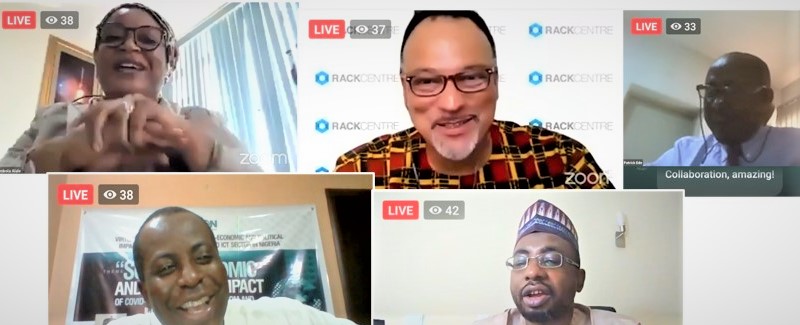By Nwakaego Alajemba
Experts and regulators at a recent virtual meeting, organised by the Association of Telecommunications Companies of Nigeria (ATCON), have expressed concerns over some of the sector’s challenges warning that if not addressed, they could erode the gains already made.
President of ATCON, Mr. Olusola Teniola, opened the conversation. He said “changing traffic with content patterns during COVID-19 has raised issues around lack of collaboration, digital skills and literacy and most importantly lack of funds.”
There is a lull in investment inflow into the Nigerian telecoms industry due to a mix of factors affecting other sectors as well. Falling oil prices, shrinking national income and country perception have connived to reduce investors’ confidence across sectors including the telecom industry. Since Foreign Direct Investment (FDI) into the telecoms sector grossed over the N21.45 trillion (about $70 billion) landmark last year in more than a decade of steady investment, investors’ interest appears to be waning.
There is need to rework policy and regulatory approaches to tending the sector, said Teniola, who in another conversation had lamented that Mobile Network Operators (MNOs) are compelled to service more than 30 different taxes at the federal, state and local levels that make Nigerian tax regime a web of pains to telecom investors.
But the ATCON’s president is optimistic of a rebound. To get the conversation going, he said: “ATCON will lead the drive in digitally transforming our industry and assisting government in digitally transforming our economy to create digital jobs for our youth using our digital infrastructure based on ubiquitous internet connectivity,”
For the Director General of the National Information Technology Agency (NITDA), COVID-19 has offered a rare opportunity to reposition and strengthen the sector in terms of manpower development. The closed borders as the coronavirus pandemic persists has only affirmed the need to look inward in building tech skills for thousands of young people, who could help close the digital job gaps in the sector.
The IT agency’s boss, Kashifu Inuwa Abdullahi, at the online conversation, revealed that over 14,000 students are actively learning about 47 different courses cut across emerging technologies including cloud computing, and artificial intelligence among others in the NITDA Academy, a virtual learning platform launched weeks back by the Minister of Communications and Digital Economy, Dr Isa Ali Ibrahim Pantami.
“The agency conceptualised, executed and launched a NITDA Virtual Learning platform with the aim to help engage young citizens to spend their time meaningfully and learn new technologies that will help create and shape the post-COVID era,” Abdullahi told the audience at the well-attended event that drew participation from stakeholders within and outside the country deliberating on how the coronavirus pandemic has affected the economy, particularly the ICT sector.
Managing Director and Chief Executive of NigComSat Limited, Dr Abimbola Alale, said the public-sector owned communication satellite company was already firming up on collaboration with many other stakeholders to help drive affordable connectivity to last mile users.
NigComSat is bolstering its business model on a network of collaborative ventures that will further make broadband connectivity available to users in remote communities in a way that helps make Nigeria’s national broadband target of 70% achievable by 2025. NigComSat is already offering a discount spree on its services and hopefully, many ATCON members should be able to leverage on this to get affordable services to last mile users.
To sustain the growth in the industry, some of ATCON’s members echoed the need for a Telecom Infrastructure Funding Bank that will specifically allow operators fund capacity expansion; and the need for intervention by the Central Bank of Nigeria (CBN) in helping to address the peculiar FOREX needs of the telecom industry which is largely driven by heavy dependency on international transactions.
New Normal and urgent need for collaboration
Both the Director of Operations at PPC Limited, Dr. Patrick Ede and Managing Director of Rack Centre, Ayotunde Coker agreed with CEO of Medallion Communications Limited, Ike Nnamani that COVID-19 has brought a new normal that IT and telecom operators as well as regulators must come to terms with.
There is a more pressing need for collaboration in order to be better positioned at addressing the common challenges that all operators face, said Coker and Nnamani.
Coker who leads the Lagos based Tier III data centre facility offering carrier neutral colocation services, said collaboration among operators, public policy makers, regulators and private industry drivers remain key to sustaining growth in the sector.
Nnamani puts it this way in a similar conversation with IT Edge News: “ATCON expects more collaboration amongst service providers and also between the private and public sector in addressing the challenges facing the telecom industry in Nigeria. Collaboration is expected in the area of telecom projects financing, infrastructure sharing, ROW authorization and pricing, lower spectrum pricing and availability, and ending of multiple taxation.”
Adjusting to the new normal will both mean coming to terms with the unfolding realities then adjusting with novel responsive models, said Ede. His words:
“Our new thinking, the social restrictions and lockdown and new the WFH [new term meaning ‘Work from Home’] has created some new thought that will make the software aspect of this Telecoms/ICT sector; the new driver of the Industry leaning on the new interests on virtual meetings, business, schools etc. “Teleconferencing, Video conferencing and other related technology demand has spiked up, even in Nigeria. These ones are those in the positive trend of this sector.
“It is important for players in this industry to realize that WFH & Virtual transactions/ meetings and other online activities and opportunities have come to stay and this may become the greatest impact of Covid 19 in Nigeria and the world in general. Travelling will greatly be reduced and affected. Work from anywhere will be encouraged by most businesses.”
Part of the objectives of the virtual meeting include to ensure effective regulation and development and building of local capacities for the speedy spread of telecom and ICT infrastructure facilities across the country.
Others are to push for the buy-in of governments at all levels to encourage telecom and ICT infrastructure development in their respective states by encouraging rapid investment through incentives such as tax holiday and provision of special intervention funds for the sector by the Central Bank of Nigeria (CBN).
The meeting held via Zoom technology and was also hosted on Facebook as a livestream.































